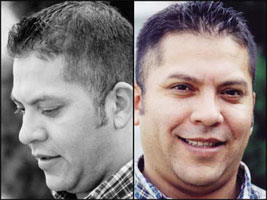| Transformed by education | Images of a championship season | Alumna saves lives in Iraq |
 |
||
| Home Forethought Campus Buzz Feature Stories Re:Search The Score Alum News Yesteryear | ||
Pain was Jesus Alamillo’s constant childhood companion. Surgeons, too. For 14 years, doctors repeatedly tried to fix the damage that polio inflicted on his lower legs. Each operation brought physical—and emotional—scars.

“I went through so many surgeries,” he says, “that I can’t remember them all.”
He could walk, even run a little, but not like the other kids. The disease ravaged his muscles, weakening them to where Alamillo eventually needed braces and sometimes a wheelchair.
At age 11, his parents decided their youngest son required better treatment. They moved from the small Mexican town of Valparaiso to California, where some of Jesus’ 12 brothers and sisters lived.
Neither he nor his parents spoke English. His father worked construction jobs while his mother babysat his nieces and nephews. Despite mounting medical bills, they made ends meet while living modestly in east Hollywood.
“It wasn’t a real bad neighborhood,” said the 35-year-old UTA graduate. “But it was near other bad neighborhoods with a lot of crime.”
Alamillo preferred school to the gang activity. He didn’t realize it then, but his junior high coach opened the door to a better life by introducing him to wheelchair basketball.
Having never used a chair before, he crashed often. But by high school, he had become one of the best young players in the country.
Jim Hayes remembers the first time he saw Alamillo. It was a helpless experience for the longtime UTA Movin’ Mavs coach.
In 1987, he took a team of junior players to a tournament in Minnesota. One of their opponents was Whitney High School from Long Beach, Calif.
“There were two kids on that team who tore us up,” Hayes recalled. “We thought we were good. But compared to them, we were not.”
One of the two was Alamillo; the other was Willie Hernandez. The coach wanted both to play for UTA but had only one scholarship, which he offered to Hernandez in 1989.
“Willie said he’d come, but only if Jesus could come, too,” Hayes said. “So I came back and raised enough money for a second scholarship.”
The backcourt duo led the Movin’ Mavs to three consecutive National Intercollegiate Wheelchair Basketball championships. Alamillo was a four-time All-American; Hernandez a two-time All-American. Both had their jerseys retired.
But what impressed Hayes more than their basketball abilities was their performance in the classroom. Both players earned mechanical engineering degrees.
“It was [academically] risky at best to bring both of them in,” Hayes said. “I knew they’d have to learn how to be students. I expected them to struggle. To make a long story short, they made the most of their opportunities.”
They’re not struggling now. Hernandez is co-founder and vice president of Per4MaX, a wheelchair manufacturing company. Alamillo is a senior project engineer for Trinity Industries in Dallas. They live a few blocks from each other in south Arlington and often practice together in a semi-pro league.
Aside from basketball, Alamillo uses a wheelchair only when going long distances. He still wears braces on his lower legs, and he needs hip replacement surgery. Earning a college degree was his ticket to “being somebody,” to becoming a productive member of society.
“With my disability, I can’t do manual labor. I need a white-collar job,” he said. “UTA played a major role by giving me an opportunity to get a free education. I’ll always be grateful.”
Reflecting on those agonizing early years, Alamillo admits he’s amazed at how his life turned out.
“I went through a lot of surgeries and a lot of pain and suffering. To be able to accomplish what I’ve accomplished means a whole lot,” he said. “I’ve come a long way since then.”
— Mark Permenter
| Archives
| Alumni Association |
Giving to UTA | UTA
Home Copyright © 2005 UTA Magazine. All rights reserved. |